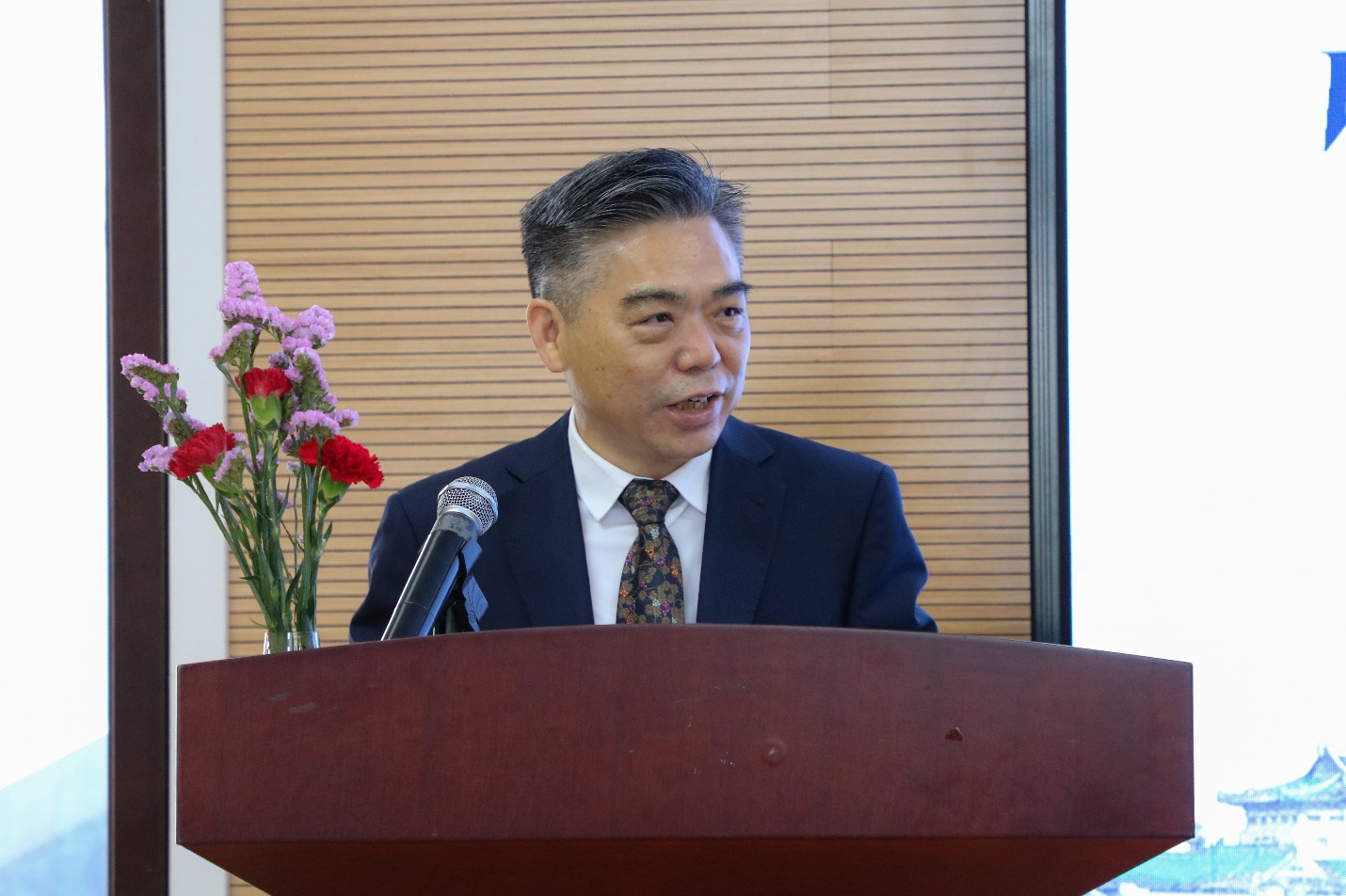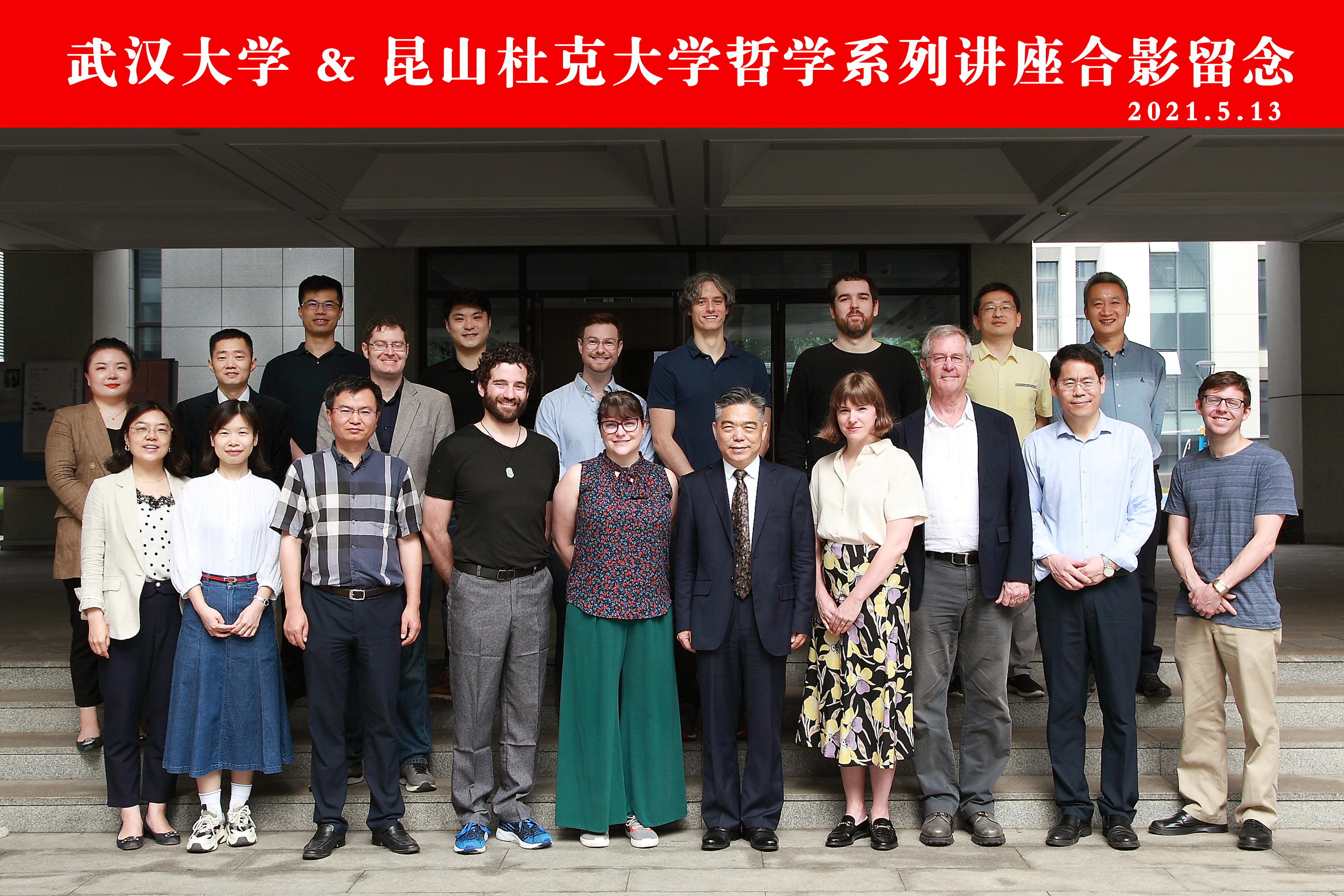The School of Philosophy hosted a two-day lecture series from 13 May to 14 May. The purpose of the lecture series was to facilitate academic exchange and collaboration between Wuhan University and Duke Kunshan University. To that end, 4 international scholars from Duke Kunshan's Philosophy and Ethics Research Cluster traveled to Wuhan: Emily McWilliams, Daniel Weissglass, Lindsay Mahon Ranthnam, and Daniel Stephens. Many people from Wuhan University were there to welcome them, including Deputy Directors of International Exchange Ling Gui and Xiaojing Liu, Party Secretary Tao Long, Associate Dean of the School of Philosophy Yun Xie, various faculty and students, and the organizers of the lecture series, Jenny Li and Peter Finocchiaro.

The event began with a short introduction from Dianlai Li, the Dean of the School of Philosophy. He then turned it over to the Vice President of Wuhan University, Qizhu Tang, who delivered a warm welcoming speech in English. Tang began his speech by emphasizing the strong academic performance of the host institution. Wuhan University's School of Philosophy has been ranked among the top 100 programs in the QS World University Rankings for many consecutive years. A crucial element of the School's high performance has been its increased efforts toward international development. That development was on full display during Tang's speech, as the room included many international faculty, like Hongyi Chair Professor Paul Patton, as well as many internationally educated Chinese faculty. Tang expressed his hope that the School of Philosophy would continue its efforts toward international development by strengthening its academic exchanges with scholars from other international programs, like our guests from Duke Kunshan University.


After the usual formalities and photographs were taken, the lectures began. The first was given by the School of Philosophy's longest tenured international scholar, Associate Professor Matt Lutz. The topic of his lecture was the supervenience challenge for normative non-naturalism. His solution depended on a “partners in innocence” strategy that connected normative non-naturalism to causal realism. Next up was Duke Kunshan's Assistant Professor Emily McWilliams. She addressed a long-standing debate regarding whether there are epistemic reasons for action. Her primary objective was to show how evidentialists (those who deny that there are epistemic reasons for action) need to clarify their notion of epistemic normativity.
The event broke for lunch, and shortly thereafter a sudden rainstorm washed away the heat. The lecture series then continued into the afternoon with a contribution from Tim Perrine, another Associate Professor in Wuhan University's School of Philosophy. Perrine sought to develop a fully general theory of representation that could explain linguistic representations (like sentences), pictorial representations (like art), and scientific representations (like models). He drew the audience's attention to several subtle distinctions that he believes other scholars have failed to appreciate, to catastrophic effect. The day ended with a lecture from Daniel Weissglass, an Assistant Professor at Duke Kunshan University. His lecture focused on attempts to formally model social behavior. He emphasized the important practical differences between game theory and social network analysis, demonstrating his points through the use of computer-assisted simulations.
After a long day of productive academic discussion, everyone broke for dinner and further informal conversation. They returned the next day, carrying umbrellas to protect from the frequent Wuhan rainstorms. The first lecture of the second day was given by Duke Kunshan's Assistant Professor Daniel Stephens. He discussed the concept of De (德) and how it could be applied to contemporary discussions of virtue epistemology. According to Stephens, De is a social virtue that has a positive influence on the rationality of others. The themes from ancient China continued with the lecture given by Xiao Ouyang, Associate Professor in Wuhan University's School of Philosophy. Ouyang addressed the unique aesthetic history of guqin (古琴). His objective was to explain the sudden historical shift in guqin aesthetics toward abstract representations of tranquility through the use of contemporary aesthetic theory.
The rain stopped and the participants went to lunch. Afterwards, Duke Kunshan's Assistant Professor Lindsay Mahon Ranthnam gave the next lecture. Her lecture was a tour-de-force presentation on Herodotus's “Histories” and the ancient Greek concept of Isegoria, which is related to the contemporary concept of freedom of speech. Though many contemporary scholars emphasize freedom of speech as an effective means of promoting the “marketplace of ideas”, Mahon Ranthnam emphasized Isegoria's role in promoting personal respect among political equals. The day -- and the lecture series as a whole -- ended with a lecture from the School of Philosophy's own Associate Dean of Philosophy, Yong Li. Li discussed issues regarding political inequality and evaluated arguments in favor of political inequality that were inspired by both traditional and contemporary Confucian thought. Many of those arguments depended on the difference between experts and non-experts, or gentlemen (君子) and commoners (小人).
Despite the rainstorms, each lecture was well-attended and was followed by vigorous and productive discussions. While the event was focused on academic exchanges between faculty at Wuhan University and Duke Kunshan, several students and faculty from other universities attended. All in all, the lecture series was a success, and everyone agreed that similar events should be organized in the future.
Written by Peter Finocchiaro



